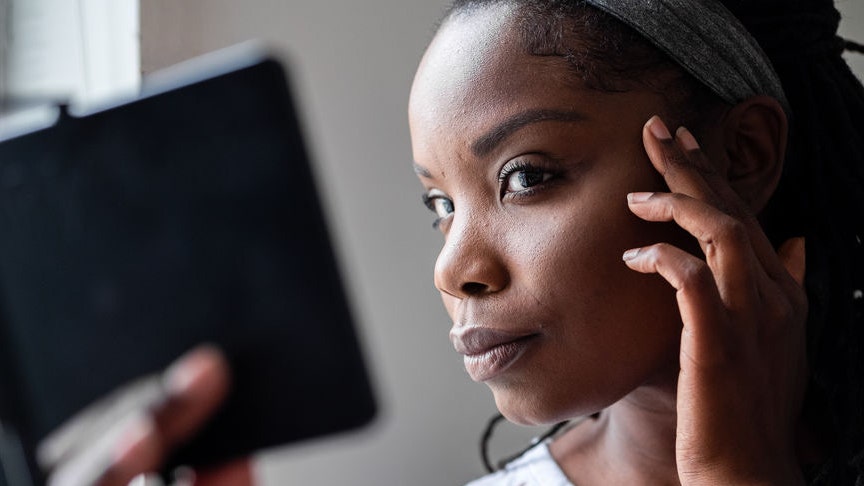8 Women With Psoriasis Share How They Keep Their Skin in Check

[ad_1]
There are meds that can help treat psoriasis—but lifestyle changes, a good skin-care routine, and mind-body techniques (stress is a proven psoriasis trigger) can make a difference, too. Psoriasis, if you’re not familiar, is a chronic autoimmune disease that causes thick, scaly patches of skin. Flare-ups most commonly appear on the knees, elbows, and scalp, but they can happen anywhere you have skin—so, from head to toe.
Here, eight women who’ve been diagnosed with the condition share the psoriasis skin-care (and self-care) tips that keep their flare-ups in check.
Turn down the shower temp
“I love hot showers, but they can be very harsh on my skin. So, I take lukewarm showers, which don’t dry out my skin as much. I also love moringa oil for my face and scalp psoriasis. It’s lightweight, doesn’t have a strong odor, partners well with my makeup, and virtually vanishes on my skin. If I consistently use it twice a day for a month, the flaky, itchy patches on my face become nonexistent.” —Alisha Bridges, diagnosed in 1994
Minimize stress
“To manage my psoriasis, I try to keep my stress level low. This includes daily prayer, meditation using the Headspace app, and owning two Boston Terriers. I prefer to meditate at bedtime. I have no idea how long I do it for because always I fall asleep before it’s over.” —Lori-Ann Holbrook, diagnosed in 2012
Try an unfussy hairstyle
“I have psoriasis on my scalp, mostly, and when it’s really bad, I use olive oil. I’ll keep my hair in a bun during the day—I like to think I’m pulling off the “wet look”—and at night, I’ll wash it and then brush it till all the flakes are gone.” —Pleun Brevet, diagnosed in 2011
Keep an eye on your diet
“Everybody has different triggers for their psoriasis. An easy way to start to unlock triggers that might be causing your flare-ups is to track what you eat. That way you can begin to identify food groups that cause your condition to flare up. I’ve found that a diet free of dairy, eggs, soy, corn, red meat, and refined sugar helps me thrive.” —Julie Cerrone Croner, diagnosed in 2012
Protect sensitive skin
“I have psoriasis on my feet and hands, which are tender and peel often. So, I use gloves when I bathe, wash dishes, and clean. And at night I put on a hydrating full-spectrum hemp cream and white gloves before bed to keep my skin from drying out too badly.” —Tamie White, diagnosed in 2019
Retire your hairdryer
“I use a sulfate-free shampoo for my scalp psoriasis. Sulfates and other chemicals typically found in shampoo can cause irritation and redness. The sulfate-free shampoo keeps those side effects to a minimum. When I get out of the shower, I try to minimize the use of a hair-dryer on my scalp, which is already severely dry, by air-drying my hair as much as possible.” —Sabrina Skiles, diagnosed in 1999
Baby your flare-ups
“I recommend using a diaper cream with zinc to fully cover your spots. They’ll be white, but it will calm them way, way down. You can rub it in after 10 minutes, or cover each one with a square of plastic wrap.” —Sandi Chaykin Teller, diagnosed in 2017
Wear non-irritating fabrics
“I firmly believe that clothes have the ability to change the way we feel about ourselves. Cashmere and merino knits will keep you cozy and warm without irritating your skin. A white blazer brings instant style to any outfit, and it disguises scalp flaking. A lined sequin top means you’re always party-ready, and those annoying scalp flakes will simply slide off. And a chic Fedora, huge cocktail ring, or fabulous pair of leopard-print boots draw the eye to your style and not your condition.” —Helen Hanrahan, diagnosed in the early ’90s
Visit The National Psoriasis Foundation at psoriasis.org for more information on managing your psoriasis.
[ad_2]
Source link




